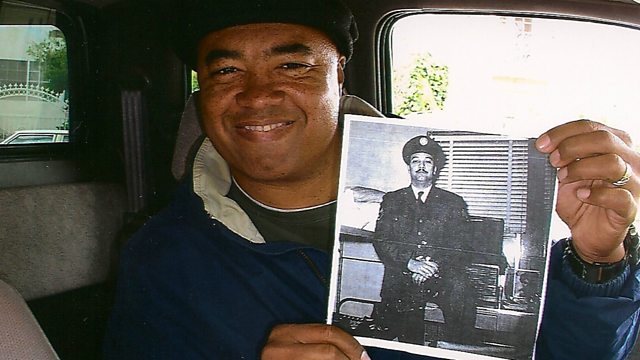As a former policeman, Hiram Johnson’s knack for investigations led him to use his skills on his family. He worked with the Los Angeles County Sheriff’s Department.
His father, Fred Douglas Johnson who was born into a black Mississippi family was light-skinned and with curly hair, totally different from all members of the family. His sisters and brother Gerald were a split opposite of him. This difference was so apparent that strangers mistook him for a white man.
Hiram’s grandmother Bernice Johnson was married but her husband was a black man. Thus, it was suspected Bernice’s husband wasn’t Fred’s biological father. Although Fred himself was aware of this, he dared not ask as there was a fear of not asking wrong questions at the time.
He was born in 1960 during segregation, a time when being African-American meant you were a second-class citizen. At the time, inter-racial marriage and sex were both criminal offences.
Speaking on BBC’s Outlook, Hiram admitted not knowing much about his grandparents. He said he knew “very little if anything. The only thing I knew about his mother was that he told me she was a beautiful black woman. I know she lived in Jackson, Mississippi because that’s where we were raised and that’s pretty much it”.
“There were a couple of white girls who came to the house and they would bring foods, clothes and other things,” Hiram recalled what his father had told him. At the time, Fred did not know who these benevolent white girls were nor where they were from.
“He told me about a football uniform that he received from these mysterious figures. He said he was so proud of these uniforms as a young boy that he wore them to school. That was so much as he knew because his mother was secretive and spoke little about the whole issue,” Hiram recalled.
“You couldn’t imagine being a black woman in the mid to late 20s. They just didn’t talk about mixed-race relations because it was illegal and the whole system was set up to protect the dignity of the white father,” Hiram said.
Hiram knew so much about his mother’s side of the family but very little about the ancestry at his father’s side. This was what made him more and more inquisitive and persistent to know where he came from and who his parents were.
“I wanted to know more about my family. I didn’t tell him this but I remember telling myself – You didn’t fall out of the trees, I need to know who my grandfather was”.
One evening some decades later, Hiram was lounging with his 79-year-old father in the living room and out of nowhere, he dropped the bomb on him: “tell me about your mother”.
“She was a beautiful black woman who was involved in an incident and was sent to prison,” Fred responded. He had been told that the incident was a fight that occurred on August 1926, two years prior to his birth. His then 21-year old grandmother was involved in a violent row with some women, one of whom she ended up killing before calm was restored.
Hiram recounted: “That was a bombshell for me to discover that his mother was involved in a murder, I was shocked. It did seem kind of daunting initially but at the same time I was encouraged as I knew, having worked in law enforcement that an investigation would have been done and so there could be a paper trail that could lead me to discover who my paternal grandparents were.”
Hiram Johnson got to work immediately and true to his conviction, there was information available on the incident.
He first discovered his grandmother Bernice was incarcerated in the infamous Mississippi State Penitentiary, also known as Parchman Farm prison.
“I found out that Parchman Farm was more like a farm than a prison. It was made up of hundreds and hundreds of acres where prisoners grew their own food and livestock and the women did their own sewing and they sewed the uniforms that the inmates wore. The whole system of Parchman Farm was very lucrative for the state and helped to replenish the economic engine that depleted after slavery,” he explained.
Set up in the late 1900s, Parchman Farm is a maximum-security prison farm located in unincorporated Sunflower County, Mississippi, in the Mississippi Delta region. The prison spans 28 square miles (73 km2) of land. Begun with four stockades in 1901, the Mississippi Department of Corrections facility was constructed largely by state prisoners and has beds for 4,840 inmates.
After slavery, there was a disproportionate number of black people in the prison and they were subjected to inhumane conditions which have been described as ‘sponsored slavery’.
“Unlike other prisons, it didn’t have barbed wires, gates and walls to keep the prisoners in. They relied on trustees, which were other inmates to do that and these other inmates were given rifles if they saw any other inmate try to escape, they were authorized to shoot to kill so these trustees would be rewarded with their freedom if they did shoot potential escapees. It was a very infamous prison,” Hiram described the conditions his grandmother had to live under.
In a bid to find out more about his grandmother, Johnson went to his hometown, Mississippi where he found a newspaper in the state archives that contained transcripts from Bernice’s murder trial. He searched for details in the police force, to gain a proper understanding.
Although the reasons were not definite, it appeared another woman had been flirting with Bernice’s husband and while the altercation aggravated, the other woman pulled a knife on Bernice who was 7 months pregnant and attacked her with it. She threatened her that she was going to cut the baby out of her and kill her. Bernice feared for her safety retrieved her gun and fired it”, an act she later described as self-defence.
Unfortunately, a 12-year-old girl named Letty Sanders who was one of the onlookers at the scene was struck by one of the bullets and later passed away
“I was very sad and I still am. One of the things I want to do is find the family and apologise to them for what happened because she happened to be at the wrong place at the wrong time.”
The court convicted Bernice of Manslaughter and sentenced her to 2 years at Parchman Farms Prison. However, nine months following her sentence, she gave birth to Fred, Hiram’s dad in prison. The father of the child remained a mystery.
“I thought well, it was another prisoner, it could have been a guard or any prison official. I discovered that the prison officials went through great pains just to separate the women inmates from the men so that kind of narrowed the focus a little bit that it was not another male inmate,” he noted.
Her early release from prison was suspicious to Hiram who thought “somebody was trying to hide something”. The prison had a maternity ward which added to his suspicion since she could have been catered for should she need antenatal care.
Hiram Johnson needed to know more, so he went to his aunt Rosie, his dad’s younger sister in Mississippi who told him Fred’s dad was a Deputy Sheriff at the prison. Fred challenged this claim and was elusive about the details which he barely knew until he passed away. This, however, did not stop Hiram from digging for more information.
He decided to do a DNA test that matched him to several people, all of whom denied knowing or sharing any connection to his late father. He was sat the verge of losing hope when a stranger contacted him – Bruce Kennamore.
He sent a message that read “Hey, we share DNA and I am interested in knowing who my African-American relatives are”. Hiram almost made the mistake of overlooking this message because he did not share many DNA markers with his man.
Bruce himself took the DNA test to determine whether his father was Scottish or German due to his surname. It turned out it was from the Palatine region of Germany. After this mystery was solved, there came along Hiram.
“I was surprised I have an African-American relative as close as Hiram. However, my mother’s relative had been in the South since the 18th century,” Bruce explained.
He remembered visiting his family members as a child when he was almost 8 years old. “Around the summers, I went to Westpoint Mississippi and stayed with relatives there and fished ride horses and run in the woods just to have fun,” Bruce Kenamore recalled
An uncomfortable truth
Hiram and Bruce found out they were actually second cousins. Hiram remembers being giddy with excitement prior to speaking with his long lost relative over the phone finally. During their conversation, Bruce listed all his relatives from Mississippi. A particular name caught Hiram’s attention ‘Fox’.
“When he told me one of his family members was ‘Fox’, it was light fireworks going off because the warden of the prison during the time my grandmother was there was named ‘Fox’ – L.T Fox (Lee Thomas Fox),” he said.
For Bruce, “At the time, Lee Thomas Fox didn’t mean anything but my maternal grandfather 8 siblings some full, some half”. Thomas Fox was one of those siblings, he was Bruce’s great uncle. His mother had even visited Thomas while he was working at Parchman Farm.
‘I remember reading an essay my mother had written about visiting a who is a warden or some official at Parchman Farm as a child. She said she was met at the train by a buckboard driven by mules driven by a convicted murderer and she sat up on the front with the driver and was frightened,” he recounted.
Hiram described his encounter with Bruce as “coming to the end of a long journey or a quest”. Meanwhile, he was convinced that the relationship between the warden and his grandmother was “more than likely, not consensual”. Bruce shared a similar opinion.
The position held by L.T Fox would have made him in charge of the entire facility notwithstanding the age gap between them as he would have been in his 50s.
“My wife and I were speaking to Kiram and we both apologised to Hiram for what happened. It seemed like the obvious thing to do, a relative of mine had done this to a relative of Hiram and it was just something that had to be done.”
The discoveries made in this investigation were complicated and uncomfortable. Hiram Johnson noted that he had a sense of pride in the fact that he had the same job as his grandfather who worked in a women’s prison. He described it as “providence”.
“If you have never known who your grandparents were, it is hard to describe that void. So when you find out who you are related to, it closes that gap in your spirit, soul and mind,” he said. He did not hold any malice against his grandfather who potentially raped his grandmother because to him, “the past is the past and it is what it is and like the Bible says “the truth shall make you free”, so I feel free and that allows me to forgive and reconcile and not have animosity”.
As for Bruce, he admitted that “Something horrible happened in 1928 but in 2018, something wonderful happened. Hiram and I met and something clicked and we were cousins and good friends”.
He remembered how joyful their first meeting was and their relationship has been growing each day. The two have been speaking at least once a week and are looking to maintain this newfound relationship as much as they can.
Hiram’s written a book about his journey called: Reason to Fight: A Search for Truth.


















